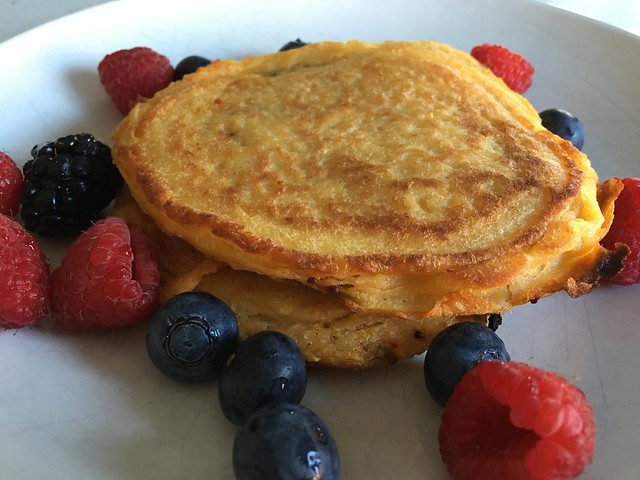You are here
How to Make Healthy Korean Pancakes
Korean pancakes, called bin dae duk, are unique in that they aren't made with flour. Traditionally, bin dae duk includes small amounts of pork, but on this particular day, we made this with nothing but hearty beans, fresh vegetables, and a small amount of rice.
The base for traditional bin dae duk is about 2 cups of mung beans, which are readily available in Korean and Chinese food markets, usually labeled as "peeled split mung beans."

If you can't locate mung beans, then you can substitute with yellow lentils or even chickpeas.
Measure out six tablespoons of calrose rice.

You could try using a different variety of rice, such as basmati or sweet brown rice, but it's probably best to stick to traditional ingredients for your first go around with bin dae duk.
Combine mung beans and rice.
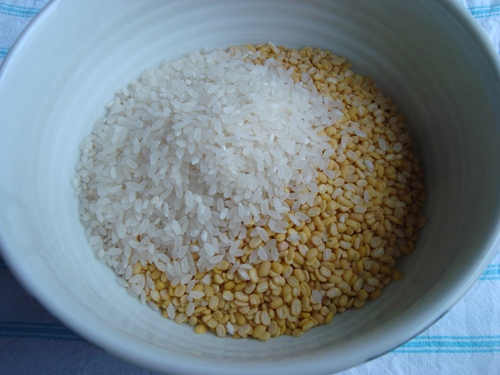
Now give the beans and rice a few good swirls with clean fingers. You won't believe how nice this feels until you give it a go. :)
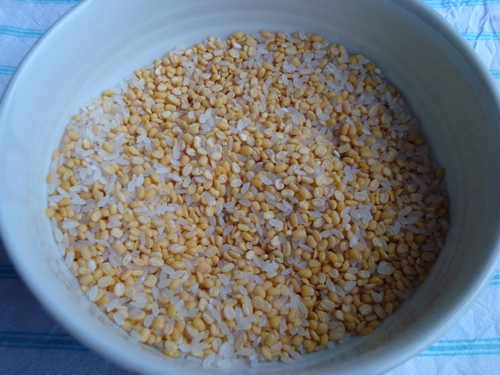
Next, add enough cold water to cover the beans and rice.
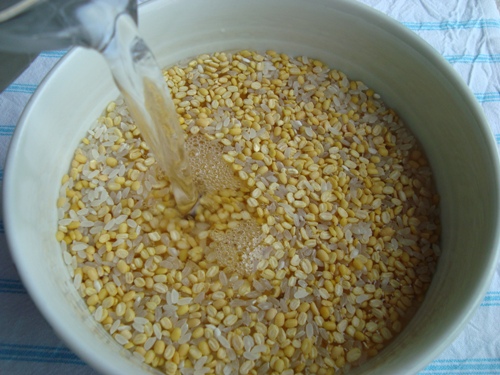
Let this sit for about four hours.

Now wash up two heads of zucchini, one red bell pepper, 3 spring onions, one yellow onion, and a handful of sesame leaves.

Sesame leaves are super rich in calcium and other minerals that are good for healthy teeth and bones. They also bring a lovely fragrance to the table. If you don't have easy access to sesame leaves, you can substitute with a handful of fresh cilantro.
Here's a closeup of sesames leaves, picked fresh from our garden this morning:

Use your best knife or mandolin to shred zucchini into thin strips.

We use a simple Japanese Mandoline for all the vegetable shredding that goes on in our kitchen.
Right after shredding the zucchini, sprinkle a flat teaspoon of sea salt on the zucchini and give it a good toss. You want to let this sit for a good hour or so to draw moisture out of the zucchini. I know this seems like a lot of salt, but you're going to lose a lot of it a bit later, and any salt that remains on the zucchini will help season the pancakes.
Next, finely chop your red bell pepper. Remove the white flesh and seeds.

Now slice up the sesame leaves or cilantro.

Ditto the green onions. Slice the onions diagonally for a nice fit with the pancakes.

And that's all for the vegetable prepping.
Once the mung beans and rice have finished soaking, strain and transfer the beans and rice to a strong blender. This is where having a Vita-Mix Blender or something similar really comes in handy.
Here's a closeup of the mung beans and rice, just before blending:

Add 1 and 3/4 cups of fresh room temperature water to the beans and rice, along with a teaspoon of sea salt. Blend until you have a nice batter that looks something like this:
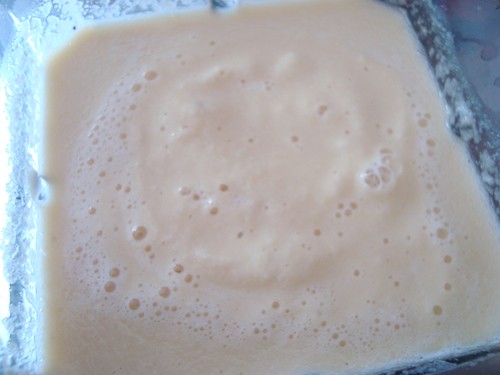
If you have to add more water to get things to blend, be sure to add just a tablespoon at a time to make sure that your batter doesn't end up too diluted. You want it to look like a relatively thick pancake batter.
Now give the yellow onion a rough chop, add it to the batter, and give it another good blend until smooth.
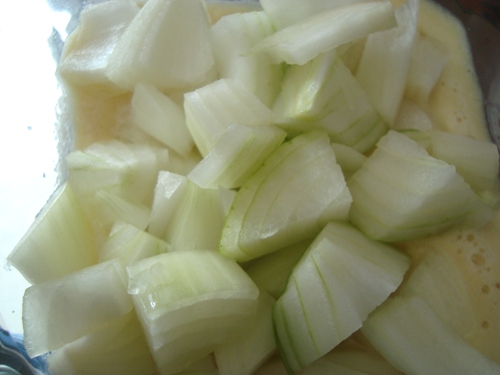
After blending:

Now transfer batter to a large bowl, much larger than what will comfortably hold the batter, as you'll be adding a small mountain of vegetables.

Remember the zucchini that we salted a while ago? Use a pair of clean hands to gently squeeze the moisture out of the zucchini - here's about what you should be left with:

Transfer zucchini to the batter.

Next comes the finely chopped red bell pepper:

Green onions...
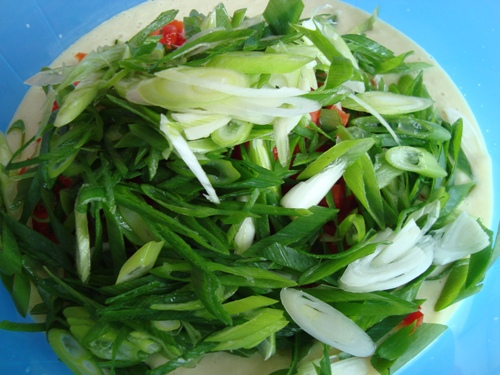
And the sesame leaves or cilantro:

Gently fold everything together with your most trusted wooden spoon.

And that's that. You have your bin dae duk batter ready to go. You can store this batter in an air-tight container for up to a few days.
As an aside, if you want to add a little meat to your bin dae duk, you can fold about 3 ounces of raw ground chicken into your batter (evenly distributing it) just before you take your batter to a hot pan.
Once you're ready to make bin dae duk that really should be eaten hot off the pan, heat a little olive or coconut oil over low to medium heat, then add generous pancake-size dollops of the batter to the pan.

Once you see a bunch of bubbles rise to the surface of the pancakes, give them a flip and cook for another couple of minutes. You should use the underside of your spatula to press down on the cooking bin dae duk for at least a few seconds to make sure that the batter and vegetables cook right through.
And the fruits of your labor:
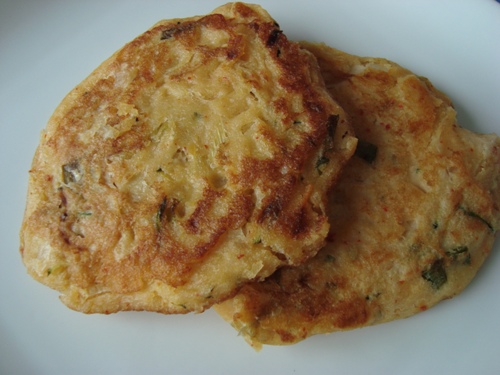
A closeup:

If you happen to have some kim chi in the refrigerator, you can always add some to the batter before cooking. Traditional bin dae duk usually comes with kim chi, which adds another layer of mouthwatering flavor and texture.
You can enjoy hot bin dae duk pancakes on their own, or if you'd like a dipping sauce, combine 2 parts soy sauce with 1 part sesame oil and 1/2 a part vinegar - be sure to whisk well with a fork or chopsticks before dipping. De-lish!
The ingredient quantities mentioned above produce enough bin dae duk pancakes to comfortably feed at least four adults. But not to worry if you're making these pancakes for one or two - you can always cook up the whole batch and re-heat leftovers later, or you can keep unused batter in the refrigerator and cook more as needed.
Happy eating. :)
For a printer-friendly version of this recipe without photos, please see:







